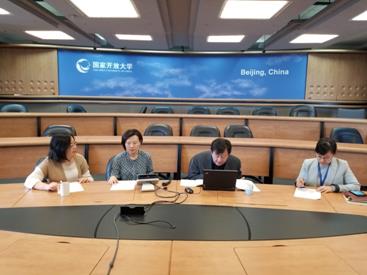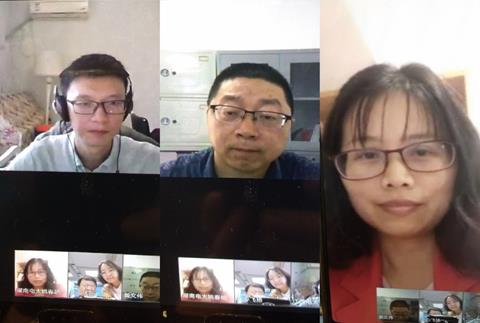 On 25 April 2019, a seminar on the construction of the syllabus for the Rural Policies and Regulations course of the Open University of China (OUC) was held in the two-way video conference room at the OUC headquarters. Front-line teachers and curriculum editors from four branches of the OUC were invited to conduct in-depth discussions on the syllabus for the curriculum reconstruction process.
On 25 April 2019, a seminar on the construction of the syllabus for the Rural Policies and Regulations course of the Open University of China (OUC) was held in the two-way video conference room at the OUC headquarters. Front-line teachers and curriculum editors from four branches of the OUC were invited to conduct in-depth discussions on the syllabus for the curriculum reconstruction process.

Associate professor Wu Lijuan, a presiding teacher; Professor and editor-in-chief Ren Dapeng from China Agricultural University; Dr. Hu Xiaoyu, vice dean of the OUC headquarters Law School, Faculty of Political Science and Law; Wang Fei from the OUC headquarters Department of Academic Affairs; Professor Yang Xinde from the Jiangxi Branch; Associate Professor Huang Wenwei from the Quanzhou Branch in Fujian Province; Associate Professor Yao Chunyan from the Hunan Branch; and Professor Xiao Chang from the Hubei Branch were invited to the conference.
Dr. Hu Xiaoyu gave a speech on behalf of the Faculty of Political Science and Law and thanked the participants for their support. This video conference is the first two-way video communication between the editor-in-chief of the text book and the front-line teachers of the branch schools. It is a platform for the teachers of the OUC branches to discuss the syllabus face-to-face and exchange opinions and suggestions on the teaching of the course.
Professor Ren Dapeng, editor-in-chief, explained the draft syllabus for Rural Policies and Regulations. He pointed out that the latest content, styles, and trends will be added to the textbook, which is to be reconstructed. The Rural Revitalisation strategy proposed by the government and the concept of the rural governance system combining autonomy, rule of law, and rule of virtue would be firmly implemented. Since this course has a wide audience and is a compulsory course for all majors in the "One College Student Per Village" Programme, it is hoped that front-line teachers will put forward valuable suggestions and opinions on the reconstruction of the course based on their own teaching experience.

At the meeting, four front-line teachers from the OUC branches gave speeches and offered comments and suggestions on the draft syllabus. Professor Yang Xinde was stationed in the village for one year last year. Based on what he saw and heard that year, he proposed that the reconstructed textbook should not only help rural cadres and students understand rural policies and laws but also educate them about the legal consequences of violations of laws and regulations. As a result, content related to legal sanctions for violations of rural policies and regulations were added to the textbook. Professor Huang Wenwei said that the narration of knowledge should be reduced and modules related to practical operation, such as operation guidelines, troubleshooting, and case review, should be increased. Professor Yao Chunyan pointed out that based on the characteristics of students in the "One College Student Per Village" programme, an explanation of the relationship between rural policies and laws should be made in the first chapter, legal terms should be interpreted in some form, and some chapters dealing with disputes should be added. Lecturer Xiao Chang proposed that the laws and regulations closely related to agriculture, rural areas, and farmers, such as the protection of farmers' rights and interests, rural education, medical care, and insurance be increased.
The depth and breadth of the discussions at the conference far exceeded expectations. At the end, Dr. Hu Xiaoyu thanked all the teachers for their support. He said that this kind of meeting not only saved conference funds but is also efficient and practical, and that it was of substantial significance to curriculum construction. He also said that the Law School would continue to explore this kind of teaching work.
By Wu Li Juan, OUC